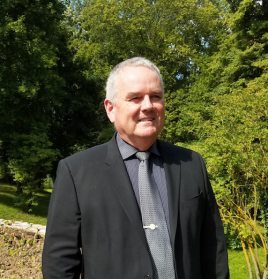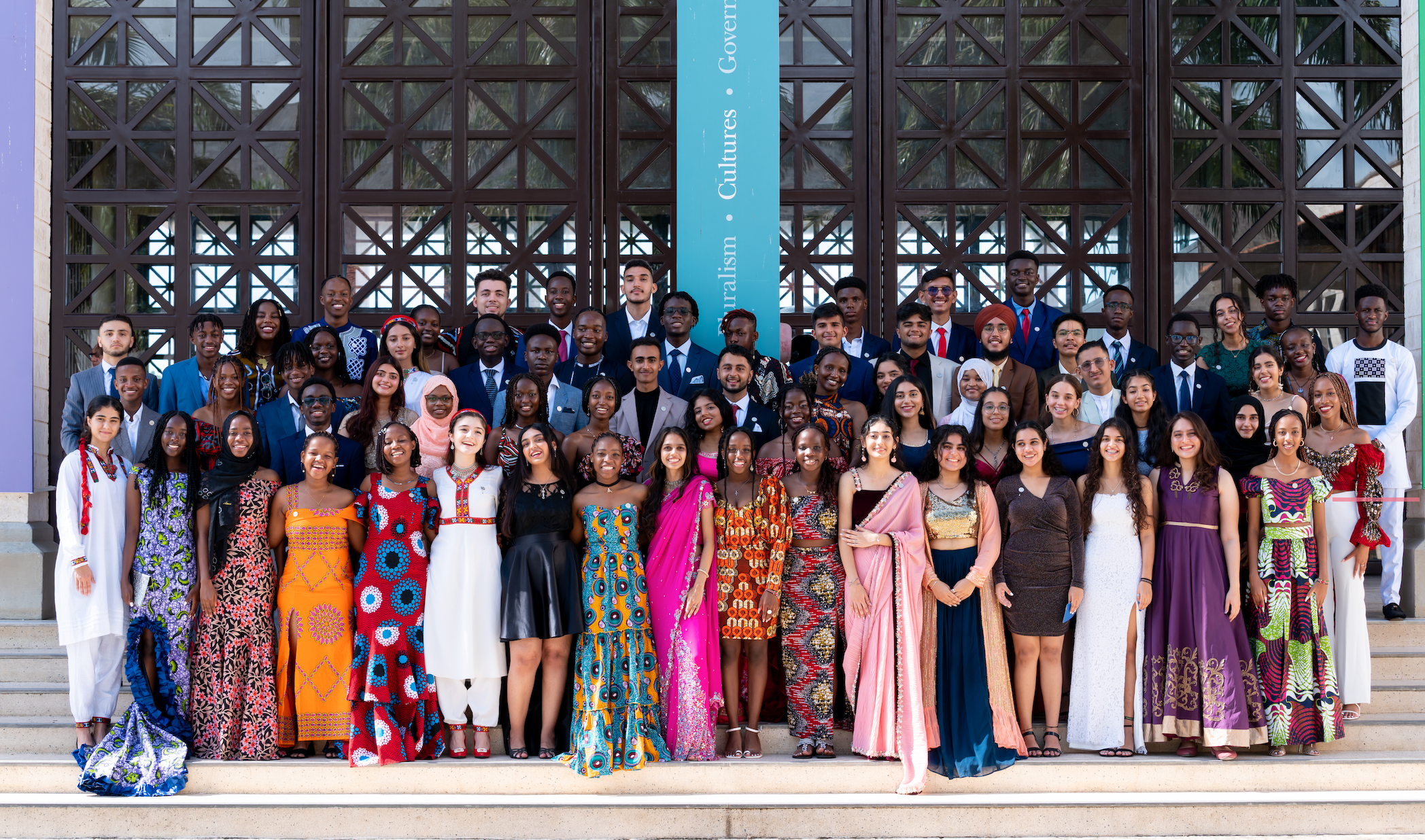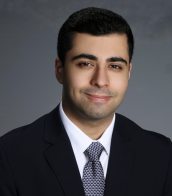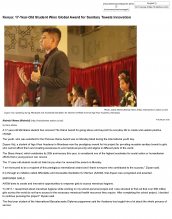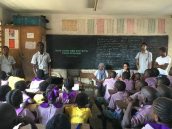At the Aga Khan Academy Mombasa, Ham Serunjogi – CEO and co-founder of African fintech giant Chipper Cash – realised the importance of staying connected to something larger than himself. The Forbes 30 Under 30 honouree is now serving as an advisor to the US President on African diaspora engagement.
Jonathon Marsh: Supporting the quality of teaching at the Academies
Jonathon Marsh has system-wide responsibility for teacher development at the Aga Khan Academies network. Having worked for the Academies for the past 10 years, he has previously had leadership roles in education in Canada, Hong Kong, the United Arab Emirates and the United Kingdom, including as the Head of Professional Development and Research for the International Baccalaureate. In this interview, he shares the highlights of his position at the Academies, and reflects on how the Academies are unique from other educational institutions.
Tell us the journey that led you to the Academies.
I first came across the AKDN when I was in Hong Kong. I read a recruitment ad in the Times Higher Education magazine seeking people to fill positions at the then recently opened Aga Khan University in Karachi. I remember looking at the ad and experiencing a strong sense of conviction that one day I would work for this organisation. More than a decade later, while working at the IB, I was introduced to Salim Bhatia [Director of Academies] by the then Chair of the IB’s governing council. Salim asked me if I knew anyone that would be interested in taking a lead role in teacher development for the emerging Academies. At the same time, he was in discussion with Monique Conn, who was my line manager at the IB, about the position of Academic Director. Monique accepted the position soon thereafter and persuaded me to join as well.
What is the most rewarding aspect of working for the Aga Khan Academies?
I think the majority of my colleagues would unanimously reply “the students”, and they would be right to do so. However, for me the job is about quality teaching, and having the opportunity to really influence the discourse on teaching and learning in the countries and regions we work within is very exciting. Having a chance to work both at the high end with government ministries, NGOs and universities and at the chalk face with individual teachers, especially young people new to teaching, provides me with a full spectrum of very meaningful and satisfying engagements.
What led you to choose your particular career?
I don’t see it as a career but rather as a vocation. I see the profession of teaching as critically important to the health and ongoing development of any society. As such, I can think of no better way to contribute to the betterment of humanity.
What attracted you to the Academy?
First and foremost, the vision and mission. Especially attractive is His Highness the Aga Khan’s insight into the importance of the profession of teaching and the need to restore its much diminished status in the various geographies within which the Academies are located.
Reflecting on your time at the Academy, is there a particular day that was especially rewarding and memorable?
There are too many to count. Among them perhaps two stand out: 1) the graduation of the first cohort of teacher interns completing the Teacher Preparation Programme (TPP), and 2) becoming the first (and as yet only) school network in the world to offer a teacher development programme recognised under the IB Educator Certificate initiative. The building of the TPP and overcoming the many associated challenges took an extraordinary amount of effort, with contributions coming from many people. Seeing it come to fruition was very gratifying.
How do you think you contribute to the inner workings of the Academies and to the achievement of its goals?
I work collegially with the Heads and senior staff in each Academy to think through and implement systems to support the quality of teaching across the network. This includes working with both external and internal providers to source and implement professional development programmes; liaising with universities and other AKDN agencies to define and conduct research and development projects; providing support for the collection and analysis of standardised data; ongoing development and application of the Academies’ teacher appraisal programme; specifying career pathways for teachers; and contributing to the specification of the Academies outreach strategy.
What sort of positive impact have the Academies had on you?
I have gained a great deal of knowledge and understanding around what it takes to start up a high quality school. I have also gained a great deal of insight into the full complexity of running a school. I have always had a great deal of admiration for those brave and committed enough to teach, but my admiration has grown considerably for those who continue to do so under very difficult circumstances.
In what ways has the Academy helped you to become a more effective advocate in the education world?
I am nearing the end of my professional life (I am not really sure what that means other than a euphemism for being over 60), and my role in the Academies has provided me with a unique opportunity to apply much of the knowledge and understanding I have gained over the years. I have drawn upon my background in philosophy and spirituality to better ground my efforts to develop systems within His Highness’s vision for the Academies. I have drawn upon my studies in educational technology to inform system development. My time at the IB has helped me to understand the particular needs of IB teachers and how to support them. The years spent in tertiary education have enabled me to better liaise with universities and support research and data collection. Working with the Academies has allowed me to not only to promote principles of good practice and high quality education, it has provided me with a platform to do so in places that are hungry for change and very much in need of educational reform.
How would you describe the teacher development work with which you engage?
I would describe it as very rewarding precisely because it is very challenging. When it comes to teacher development, we are dealing with many layers of readiness among practitioners. Each country has its own approach to teacher preparation, and within each country not all teachers are given equal standing. For example, senior school teachers are typically better trained and better paid than junior school teachers. Junior school teacher preparation often does not involve gaining a university degree, and only those who could not get into a university opt for junior school teacher training programmes. Convincing people that teaching young children is at least as complex and difficult as teaching older kids is surprisingly difficult. Yet how are we supposed to achieve the kinds of sophisticated learning outcomes envisioned by His Highness if we do not prepare students for them right from the beginning? Building the necessary culture of professional respect for the expertise of all teachers, and indeed helping teachers to define and value their own professional identities is particularly important and very challenging.
What do you think sets the Academies apart from other educational institutions?
The Academies are not unique. There are other schools around the world which share many of the same attributes. However, they do have some very interesting defining characteristics. Firstly, the degree to which they are vision and mission led is compelling for many. Secondly, the commitment they have to provide access to excellent education to talented kids regardless of their ability to pay. Thirdly, their commitment to serve the countries they are in by providing an international standard of education for a majority of local students and employing 80% local teachers. Lastly, their rootedness in the local community and their ability to draw upon the many strengths of the wider AKDN as well as the committed and generous support of the Ismaili community.
How do you think the Academies ensure a climate of pluralism?
The Academies strive to value each child and each member of staff as a unique individual, and expect each to make a unique contribution. A pluralistic perspective is promoted by bringing together individuals from across cultural boundaries, tribal lines, disparate geographic locations, genders, ages, faiths, and economic backgrounds and providing them with a continuous and intensive opportunity to engage with, understand, and come to value each other’s “otherness”.
Alumni
Education at its best facilitates positive growth in all domains – intellectual, social, physical, ethical and spiritual – leading to the well-rounded development of the child. The Aga Khan Academies aim toward this ideal, and the values they espouse are reflected in each school’s aspirations for its students.
The vision for Aga Khan Academy graduates
Students at an Academy pursue a well-balanced education combining intellectual inquiry, academic excellence, sporting and cultural activities, and a grounding in ethics and moral reasoning.
They are committed to rigour and self-discipline in their studies and subscribe to the principles of intellectual honesty in the preparation of their work.
Read more here.
The Aga Khan Academy Alumni Network
Fill out the AKA Alumni online questionnaire here
Connect with us via our Facebook and Instagram pages.
Interested to know more about our graduates? See spotlights on our alumni

Terms and Conditions of Use of the agakhanacademies.org Website
1. Welcome
Welcome to the agakhanacademies.org website (the “Site”) of the Aga Khan Academies, which are part of the Aga Khan Education Services, an agency of the Aga Khan Development Network (“AKDN”). The Site is owned and operated by the Aga Khan Foundation (the “Foundation”). These terms and conditions govern your use of the Site. Please read them carefully. If you do not accept these terms and conditions of use, please do not use the Site. By using the Site, you agree to abide by the following conditions of use.
2. Content Rights
The copyright and all other rights in all of the material on the Site are owned by the Foundation, other members of the AKDN, related entities or third parties (hereinafter “Rights Owner” or together “Rights Owners”). All materials on the Site are presented with the permission of the Rights Owners. The content includes photographs, images, databases, and other audio-visual material, the copyright in which is owned by the Rights Owners and, as regards Rights Owners other than the Foundation, licensed to the Foundation for display on the Site.
Unless otherwise stated, all materials on the Site may be reproduced for non-commercial informational and educational purposes without permission, provided that (i) due acknowledgement is given to the Foundation or relevant Rights Owner, (ii) no modifications are made, (iii) and all copyright legends and notices are displayed in the same form and manner as on the original. Material may only be used in the language displayed on the Site. You may not adapt, alter or create any derivative work from any of the content of the Site, without prior written permission of the relevant Rights Owner or Rights Owners. You may not republish, distribute, sell or make any other commercial use of the content, without prior written permission of the Rights Owner. You may not retrieve content from the Site to create or compile, directly or indirectly, a collection, compilation, database or directory (whether through robots, spiders, automatic devices or manual processes), without prior written permission of the Rights Owner. You may contact the Foundation at: Aga Khan Foundation, 1 – 3 Avenue de la Paix, 1211 Geneva, Switzerland, data.protection@akdn.org.
You may not republish, distribute, sell or make any other commercial use of copyright material owned by a third party, without the prior written consent of that party, and such consent must be obtained directly. For avoidance of doubt, the Foundation does not represent nor does it act as an agent for these parties.
Nothing contained herein shall be construed as conferring any license in respect of the material, other than its reproduction as stated above.
All opinions expressed in any articles or other authored material on the Site are those of the respective authors themselves and do not necessarily represent the views of the Foundation.
The Site may contain links to other websites, which are not reviewed or controlled by the Foundation. The Foundation shall not be responsible for the content of any such websites nor for the terms of use applicable to the content of any such websites. You are solely responsible for any access and use of any such websites. It is your responsibility to consult the terms of use published on any such websites and to abide by them.
3. Use of the Site
You may only use the Site in accordance with these terms and conditions and for lawful and proper purposes.
The Site is provided to you on an “as is” basis. There is no guarantee that the Site or any content is error-free, suitable for any particular purpose, accurate or up-to-date. You are entirely responsible for your use of the Site, and for the consequences of relying on any content. You are advised to verify the accuracy of any information before relying on it.
The downloading or other use of the material on the Site is done at your own discretion and risk, and with your agreement that you will be solely responsible for any damage to your computer system, loss of data, or other harm that may result from such activities.
To the full extent allowed by applicable law, you agree that the Foundation will not be liable to you for any such damage or loss that may arise in connection with or as a result of your use of the Site, or in connection with your use of other websites linked to the Site.
Your access to the Site may be suspended, blocked or terminated at any time without prior written notice thereof.
4. Names Acronyms Symbols and Logos of Rights Owners – Use of Trade or Service Marks
The names, acronyms, symbols and logos appearing on the Site are owned by the respective Rights Owners and are protected. You shall not use or adapt any such names, acronyms, symbols and logos, nor imply that you are connected or associated with them, unless you have obtained the prior written permission of the Rights Owner. You may contact the Foundation at: Aga Khan Foundation, 1 – 3 Avenue de la Paix, 1211 Geneva, Switzerland, data.protection@akdn.org.
The use of trade or service marks on the Site is consistent either with the usage policy or with the consent and permission of the Rights Owner.
5. Privacy Policy
Please read the privacy policy (below) which also forms part of these conditions of use. You have the right at any time to access, rectify and/or delete your personal data (and that of the person or persons for whom you act as legal representative) by sending an e-mail to data.protection@akdn.org or contacting the Foundation at: Aga Khan Foundation, 1 – 3 Avenue de la Paix, 1211 Geneva, Switzerland.
6. General Conditions
The information and material on the Site may be edited, improved, modified or changed at any time, without notice. The Site may be terminated at any time, without notice.
These terms and conditions of use may be modified from time to time, and any such modification shall be effective immediately upon posting of the modified terms and conditions of use on the Site. Accordingly, your continued access or use of the Site is deemed to be your acceptance of any such modified terms and conditions.
If you breach any of these terms and conditions, authorisation to access and use the Site will cease and terminate, and any material downloaded or printed from the Site in violation of the terms and conditions must be immediately destroyed.
If for any reason a court of competent jurisdiction finds any provision of these terms and conditions to be unenforceable, that provision shall be enforced to the maximum extent permissible and the remainder of the terms and conditions shall continue in full force and effect.
Any failure to enforce or exercise any right inherent in any provision of these terms and conditions, or any related right thereof shall not constitute a waiver of that right or provision.
The ordinary courts of Geneva shall have exclusive jurisdiction to settle disputes arising out of or in connection with these terms and conditions (including the privacy policy). These terms and conditions (including the privacy policy) are subject to and governed by Swiss law (including the Berne Convention for the Protection of Literary and Artistic Works).
Privacy Policy
This privacy policy constitutes an integral part of the terms and conditions of use of the agakhanacademies.org website (the “Site”), which is owned and operated by the Aga Khan Foundation (the “Foundation”). It describes the ways that the Foundation undertakes to protect your personal data (and that of the person or persons for whom you act as legal representative) (the “Personal Data”), the way in which we collect information from you when you use the Site and for what such data may be used. This privacy policy applies to any information obtained by the Foundation through your use of the Site. It is not applicable to any internet websites controlled by third parties that the Site may link to (“Third Party Sites”). Please review the privacy statements of Third Party Sites, as the Foundation is not responsible for and has no influence on the content or the privacy practices of Third Party Sites.
1. Personal Data is collected from you in various ways.
From time to time, there may be projects, programmes and services which may allow you to provide Personal Data to us via the Site. By providing Personal Data, you are consenting to the Foundation’s use of the Personal Data, and you consent that the Foundation may disclose this information to other members of the AKDN and related entities or to third party providers, inside or outside your country of residence, for data processing. You also consent to the retention of this Personal Data.
In particular, your Personal Data can be collected as set out in the Appendix to this privacy policy.
You are entitled to a copy of your Personal Data and to have it rectified or deleted as required by applicable data protection legislation. Should you have any concerns or requests regarding your Personal Data, you may send an e-mail to data.protection@akdn.org. Please note it may take some time to process your request and to cancel your participation, if this is requested. During any such period your Personal Data will still be available on the Site. We will endeavour to amend or remove your information from the Site as quickly as is reasonably possible.
2. No one under age is allowed to enter any Personal Data or otherwise communicate with the Site, unless the legal representative or representatives of the minor (generally the minor's parents or parent) and us formally consent in advance. Personal Data entered by a minor unbeknownst to us without such consent will be deleted from our database as quickly as possible after we become aware of the fact.
3. We use appropriate technical and organisational security measures in order to protect Personal Data against unauthorised access, accidental or intentional manipulation, loss and destruction.
4. The Internet is a global environment. In order to administer the Site, we may need to transfer Personal Data to locations outside the European Economic Area (the “EEA”) and process Personal Data in locations outside the EEA. The level of data protection offered in such jurisdictions may be less than that offered within the EEA. By clicking “subscribe”, “submit”, “log in” or “submit by e-mail”, as the case may be, or any other such term which results in you sending us Personal Data, you accept this privacy policy and you consent to such transfers.
5. The Foundation may disclose Personal Data when required by law or regulation or in the good faith belief that such action is necessary in order to conform to the edicts of the law, comply with legal mandates, or to protect the rights, property, or personal safety of personnel of the Foundation, other members of the AKDN, related entities, the Site’s users and the public.
6. The Site uses “cookies” (text files) which will be saved on your computer and which will allow an analysis of your use of the Site. This information will be used to compile reports about the Site activities for the Site operator and will facilitate provision of additional services in relation to the Site and internet utilization. If you do not wish to receive “cookies”, you may set your web browser to reject these, if your browser so permits.
7. The Site keeps track of user activity via log files stored on our web servers. The log files include information on IP addresses, browser types and versions, pages viewed, and entry and exit paths. Log files assist us in offering a personalised Web experience, diagnosing server problems, administering the website and tailoring information for the end-user.
8. When we send you emails, we may include a Web beacon to allow us to determine the number of people who open our emails and the links on which they click. Web beacons can be refused when delivered via email. If you do not wish to receive Web beacons via email, you will need to disable HTML images in your email software.
9. By using the Site, you acknowledge that you have read the terms of this privacy policy and that you consent to our use of data for the purposes set out above. This privacy policy may be amended from time to time and any changes will be posted on the Site and will become effective when posted.
10. Should you have any concerns or requests regarding your Personal Data, please send an e-mail to data.protection@akdn.org or contact the Foundation at: Aga Khan Foundation, 1 – 3 Avenue de la Paix, 1211 Geneva, Switzerland.
APPENDIX
You have the option on the Site:
- of subscribing to the Aga Khan Academies Newsletter (the “Newsletter”). In registering your name and e-mail address, you are providing your Personal Data to us via the Site. By clicking “join now” or any other such term which results in you sending us Personal Data, you are consenting to the Foundation’s use of your Personal Data to enable the Foundation to send you the Newsletter, from time to time. If you wish to cease receiving the Newsletter, then click “unsubscribe”.
- of applying for a place at an Academy. In filling out the forms, you are providing Personal Data to us via the Site. By clicking “submit” or any other such term which results in you sending us Personal Data, you are consenting to the Foundation’s use of your Personal Data to enable the Foundation to give you the requested information. You consent that the Foundation may disclose your information to third party providers, inside or outside your country of residence, for data processing.
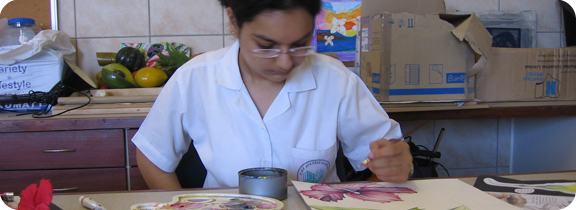
International Baccalaureate
The academic programme at the Aga Khan Academies was developed following the principles of the International Baccalaureate (IB), a world-class educational programme that emphasises rigorous, consistent schooling aligned to international standards. As a result, the Academies' Learner Profile exemplifies students and faculty that are open-minded, principled, reflective and inquiring individuals.
The International Baccalaureate programme provides international standards of evaluation, allowing students to pursue post-secondary education at world-class institutions of their choosing, with the skills for independent, creative thought and inquiry. It has become the curriculum of choice at international schools throughout the world.
The IB has come to be known not only for academic excellence but also for promoting pluralism – an understanding and appreciation of other cultures, languages and points of view.
The IB originated in Switzerland when teachers at the International School of Geneva, working with schools in Asia, Europe and the Americas, created the IB Diploma. The programme is administered by the International Baccalaureate, a non-profit institution based in Geneva, Switzerland.
Through its Primary Years (nursery school to year 5), Middle Years (years 6–10), and Diploma (years 11–12) Programmes, the focus is on creating a globally relevant education, with the integration of local contexts. Additionally, students at each Aga Khan Academy are instructed in both English and the national language, so they are able to work within their communities as well as around the world.
For more information on the International Baccalaureate, please visit the IB website.
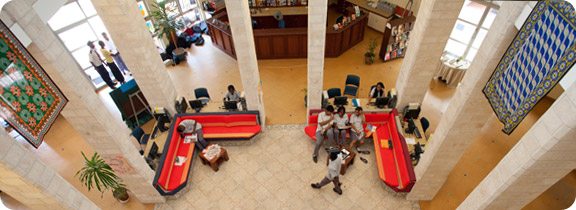
Articles of Interest
The articles listed below have been drawn from the Aga Khan Academies newsletter. They include feature stories and information on aspects of the Aga Khan Academies programme.
Subscribe to the Aga Khan Academies newsletter
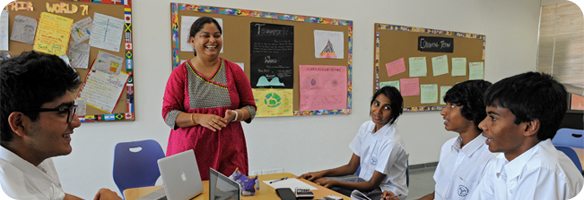
Job Opportunities
The Aga Khan Academy Hyderabad is committed to hiring the best educators and staff from within the local community, nationally and internationally. We welcome your interest in working with us and invite you to explore the opportunities available.
About the Aga Khan Academy Hyderabad
Set on a stunning 100-acre campus, south of the historic city of Hyderabad, the Aga Khan Academy Hyderabad is part of a network of Academies, which will soon form an inter-connected global learning community of 18 schools in 14 countries. Based on the vision of His Highness the Aga Khan, the Academy recruits exceptional students from diverse backgrounds irrespective of their ability to pay. Our holistic educational philosophy, International Baccalaureate curriculum and commitment to pluralism enables students to become ethical leaders who are empowered to make positive contributions in an ever-changing world. To find out more about the Academy, click here.
Working at the Aga Khan Academy Hyderabad
Here at AKA Hyderabad, we are united in the belief that education can be a force for good in the world. We look for outstanding educators whose work is characterised by passion, the ability to inspire others and make a difference, and work that is committed to helping students find their grand passion in life.
We recognise that the knowledge, skills and experience of our staff are a vital part of achieving our commitment to excellence. The Academy is strongly committed to continuing education for our faculty, and we provide regular opportunities for professional development.
The Academy is also proud to offer an outstanding work environment with excellent facilities, and a unique and diverse school community.
Current job opportunities
- Primary Years Programme teacher
- Art teacher (Primary Years Programme/Middle Years Programme)
- EAL specialist
- Math teacher (Middle Years Programme/Diploma Programme)
- Humanities teacher (Middle Years Programme/Diploma Programme)
How to apply
- CV (two pages)
- Cover letter (one page)
- Two references and their contact information
- A 250-300 word personal statement on how the Academy's vision and values find expression in your own life and teaching.
For more information on each of the vacancies, visit the AKDN Career Centre. Listings are updated regularly, so be sure to check back often.
‘Saturday School’@ the Academy – 17 September 2016
Academy Junior School will celebrate International Dot Day this week with a global commemoration of creativity, courage and collaboration through creative activities.
